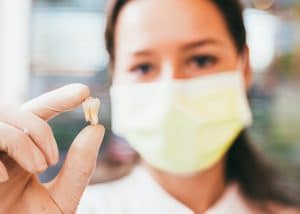 The good news about personalized dental treatment is that it ensures you receive the most appropriate care for any oral health concern. Generally, this means you have a better chance of preserving your healthy, natural tooth structure whenever it’s compromised by structural damage, decay, or more. However, it also means that, if necessary, your dentist can more precisely diagnose when a tooth is so compromised that it can’t be saved. If your dentist suggests extracting the tooth, then it’s important to take the suggestion seriously.
The good news about personalized dental treatment is that it ensures you receive the most appropriate care for any oral health concern. Generally, this means you have a better chance of preserving your healthy, natural tooth structure whenever it’s compromised by structural damage, decay, or more. However, it also means that, if necessary, your dentist can more precisely diagnose when a tooth is so compromised that it can’t be saved. If your dentist suggests extracting the tooth, then it’s important to take the suggestion seriously.
When a dental crown can’t fix your tooth
Restorative dental treatments are designed specifically to fix and restore teeth that are decayed or damaged in order to help you preserve the rest of the tooth’s healthy, natural structure. For example, even teeth that are severely damaged can often be fixed and saved with a custom-designed dental crown. The point of a crown is to restore the tooth’s function and protect what remains of its healthy structure from suffering further damage. Yet, if the tooth is so compromised that it can’t support the dental crown, then it may need to be extracted and replaced with a dental implant-supported dental crown.
When your tooth infection is too invasive
Tooth decay is more common than structural damage, but for many people, it’s also easier and more effective to address. For instance, tooth decay and cavities are most often treated in their mild stages with tooth-colored fillings, before the decay has a chance to affect a significant portion of your tooth’s healthy, natural structure. Yet, tooth decay will progress the longer it’s left untreated, and when it becomes extreme, it can erode much more of your natural tooth structure than realize at first. If this occurs, then extracting the tooth could be important to stopping the decay inside of it from becoming a bigger problem for the rest of your oral health.
When one of your third molars gets impacted
One of the more common reasons for needing tooth extraction involves the impaction of one or more of your third molars, or wisdom teeth. Third molars typically start developing around the ages of 17-25, and for many people, there is already little room left at the ends of their dental ridges. This can lead to the molars’ impaction as they try to erupt along the dental ridges, and a host of problems resulting from the impaction. Extracting the molars as soon as possible is often the best way to avoid the potential consequences of impacted wisdom teeth.
Learn if you can benefit from tooth extraction
In some severe cases, extracting a tooth is the only way to save the rest of your oral health from the consequences of more extreme dental troubles. To learn more, schedule a consultation by calling the Dental Centre of Conroe in Conroe, TX, today at (936) 441-4600. We serve patients from Conroe and all neighboring communities.


